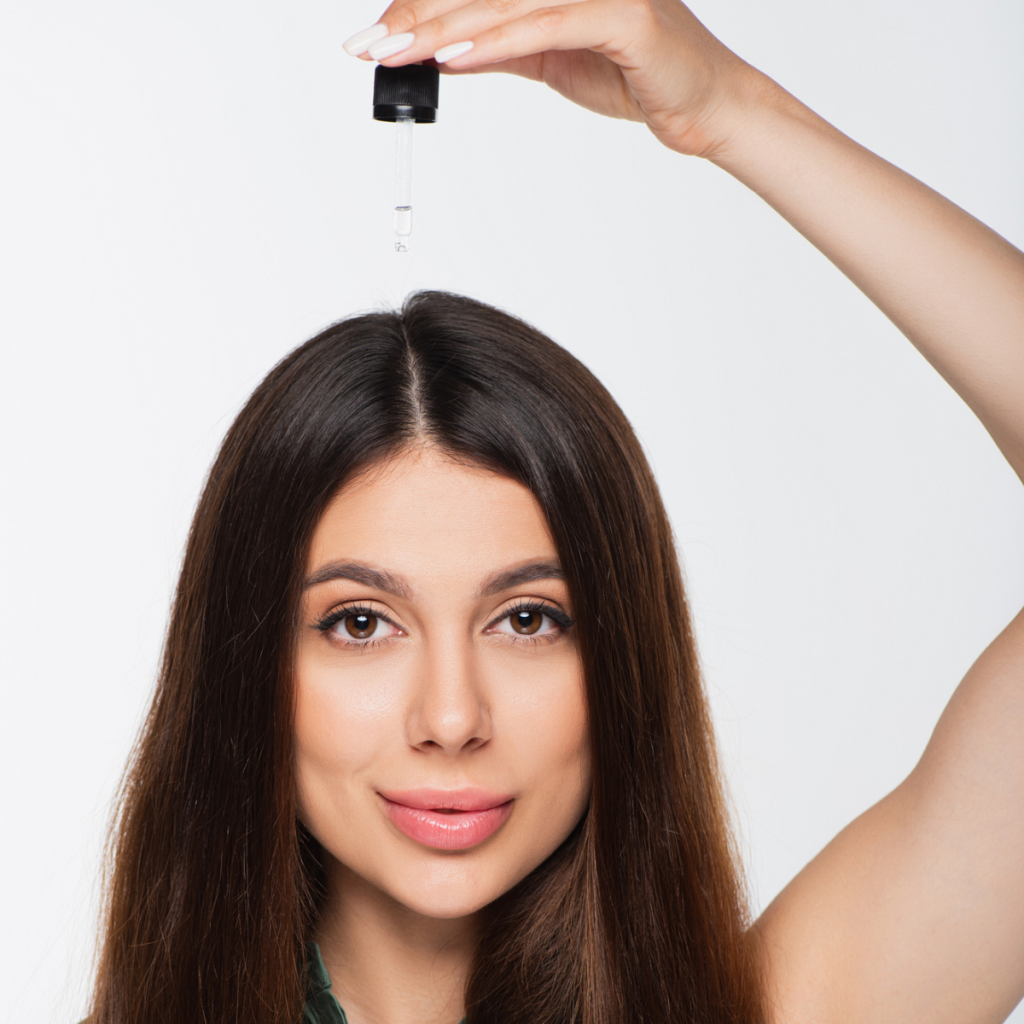Learn how to distinguish between a naturally oily scalp and an overproduction of oil caused by other factors.
How to Differentiate Between a Naturally Oily Scalp and an Overproduction of Oil Due to Other Factors
Have you ever found yourself wondering if your scalp is naturally oily or if it’s just a result of some other factor? Well, you’re not alone! Understanding the basics of scalp oil production can help you differentiate between the two and take appropriate measures to keep your scalp healthy and balanced. So, let’s dive right in and uncover the secrets behind that shiny crown of yours!

Understanding the Basics of Scalp Oil Production
Before we can differentiate between a naturally oily scalp and an overproduction of oil, it’s important to understand what scalp oil is and why it plays a crucial role in the health of our hair and scalp. So, grab a cup of tea and let’s get nerdy!
Scalp oil, also known as sebum, is a natural substance produced by your sebaceous glands. These glands are found all over our bodies, including our scalp. They are like the oil factories of your scalp, working tirelessly to produce and secrete sebum. But why is scalp oil important, you ask? Well, scalp oil helps maintain the pH balance of your scalp, keeps your hair hydrated, and even protects against harmful environmental factors. It’s like a superhero cape for your scalp!
Sebum production is a fascinating process. The sebaceous glands are connected to the hair follicles, and they release sebum onto the scalp through these follicles. This oil then spreads across the scalp, providing nourishment and moisture to both the hair and the skin. It’s a delicate balance, and when everything is working harmoniously, your scalp and hair are in their healthiest state.
But what happens when there is an overproduction of scalp oil? Well, that’s when things can get a little greasy. An overproduction of sebum can lead to an oily scalp, which can make your hair look limp and greasy. It can also contribute to issues like dandruff and clogged hair follicles. So, it’s important to understand the factors that can influence sebum production and how to maintain a healthy balance.
Various factors can affect scalp oil production. Hormonal changes, such as those that occur during puberty or pregnancy, can increase sebum production. Stress, diet, and even certain medications can also play a role. Understanding these factors can help you better manage your scalp’s oil production and keep your hair and scalp looking and feeling their best.
Now that we have a better understanding of what scalp oil is and why it’s important, let’s dive a little deeper into the role of sebaceous glands in oil production. These tiny glands are truly remarkable. They are connected to the hair follicles and are responsible for producing and secreting sebum.
The sebaceous glands are most active during puberty when hormone levels are high. This is why teenagers often struggle with oily skin and hair. As we age, sebum production tends to decrease, which is why many people experience dryness as they get older. However, this is not always the case, as some individuals may continue to have oily scalps well into adulthood.
When the sebaceous glands produce sebum, it travels up the hair follicles and onto the scalp. This process helps distribute the oil evenly, providing moisture and nourishment to the hair and scalp. It’s a beautifully designed system that keeps our hair and scalp healthy and protected.
So, the next time you look in the mirror and notice a bit of shine on your scalp, remember that it’s your sebaceous glands working hard to keep your hair and scalp in optimal condition. Embrace the natural oils and give your scalp the care it deserves!
Identifying a Naturally Oily Scalp
Now that we’ve covered the basics, it’s time to figure out if your scalp is naturally oily or if there’s something else going on. Here are a few telltale signs to look out for:
Characteristics of a Naturally Oily Scalp
A naturally oily scalp tends to feel greasy to the touch, even shortly after washing. You may notice that your hair looks limp and lacks volume. And let’s not forget about the constant battle with oily roots. It’s like they have a mind of their own! But hey, embrace your natural shine. It’s a sign of a well-moisturized scalp!
When it comes to a naturally oily scalp, there are a few other key characteristics to keep in mind. One of the most common is the tendency for your hair to become greasy quickly. No matter how often you wash your hair, it seems like the oiliness just can’t be tamed. This can be frustrating, but it’s important to remember that it’s simply your body’s way of keeping your scalp moisturized.
Another characteristic of a naturally oily scalp is the appearance of dandruff. Yes, you read that right. Oily scalps can actually be prone to dandruff. This is because the excess oil on your scalp can lead to the overgrowth of yeast, which in turn can cause flaking and itching. So, if you’ve been battling dandruff along with your oily scalp, know that you’re not alone.
Common Misconceptions About Oily Scalps
Hold up! Before we go any further, let’s debunk some myths about oily scalps. Contrary to popular belief, a naturally oily scalp is not a result of poor hygiene. It’s just your body doing its thing and keeping your scalp happy. So, put down that shampoo bottle and step away from the kitchen sink. Your hair will thank you!
One common misconception about oily scalps is that washing your hair more frequently will help reduce the oiliness. However, this is not necessarily the case. In fact, over-washing can actually strip your scalp of its natural oils, causing it to produce even more oil to compensate. So, instead of reaching for the shampoo every day, try spacing out your washes and see if that helps balance the oil production.
Another myth about oily scalps is that they are more prone to acne. While it’s true that oily skin is more susceptible to breakouts, this doesn’t necessarily apply to the scalp. Acne on the scalp is usually caused by other factors, such as clogged hair follicles or an overgrowth of bacteria. So, if you’re dealing with acne on your scalp, it’s best to consult a dermatologist for proper diagnosis and treatment.
Recognizing Overproduction of Scalp Oil Due to Other Factors
Okay, let’s say your scalp feels oilier than a freshly fried donut, but you suspect it’s not just your body’s natural oil production at work. In that case, there could be some external or internal factors causing an overproduction of scalp oil. Let’s explore them further:
External Factors That Can Increase Oil Production
External factors like hot weather, humidity, and even certain hair products can contribute to an overproduction of scalp oil. It’s like your scalp is throwing a party, and everyone’s invited! But don’t worry, we’ll crash that party and bring back the balance.
When the sun is shining and the temperature rises, your scalp might go into overdrive, producing more oil to protect itself from the elements. The heat and humidity can also create the perfect environment for oil glands to go into overproduction mode. And let’s not forget about those hair products that promise to give you luscious locks but end up leaving your scalp feeling greasy. Some shampoos and conditioners contain ingredients that can strip away too much oil, causing your scalp to compensate by producing even more.
But fear not! There are ways to combat these external factors and keep your scalp’s oil production in check. Using a gentle, sulfate-free shampoo can help maintain a healthy balance of oils on your scalp. Additionally, incorporating a clarifying treatment into your hair care routine can remove any product buildup that might be contributing to excess oiliness. And don’t forget to protect your scalp from the sun’s rays with a hat or sunscreen specifically formulated for the scalp.
Internal Factors That Can Lead to Overproduction of Oil
Ah, hormones. They can be both a blessing and a curse. When they’re imbalanced, they can wreak havoc on your scalp and lead to excess oil production. Don’t worry, though! We’ll help you navigate this hormonal rollercoaster and get your scalp back on track.
During puberty, hormonal changes can cause an increase in oil production throughout the body, including the scalp. This is why many teenagers experience oily hair and skin during this time. Hormonal imbalances can also occur during other life stages, such as pregnancy or menopause, leading to changes in scalp oil production.
But hormones aren’t the only internal factor that can contribute to an overproduction of scalp oil. Stress can also play a role. When you’re under stress, your body releases a hormone called cortisol, which can stimulate oil glands and result in greasy hair. So, if you’ve been feeling stressed lately, it might be time to incorporate some relaxation techniques into your routine.
Don’t fret! There are ways to manage these internal factors and keep your scalp happy. Eating a balanced diet and staying hydrated can help regulate hormone levels and promote overall scalp health. Incorporating stress-reducing activities like yoga or meditation into your daily routine can also have a positive impact on your scalp’s oil production.
How Hormones Influence Scalp Oil Production
Now, let’s dive deeper into the fascinating world of hormones and their impact on scalp oil production. Trust us, it’s not as boring as it sounds!
The Impact of Hormonal Changes on Scalp Health
As we go through life, our hormones go on their own little rollercoaster ride. Puberty, pregnancy, and menopause are just a few examples of hormonal milestones that can affect our scalp health. So, if you notice some oiliness during these times, blame it on the hormones!
Hormonal Imbalances and Overproduction of Scalp Oil
But what happens when these hormones get out of whack? Well, it can lead to an overproduction of scalp oil. It’s like your hormones are having a party, and your scalp is the dance floor. But don’t worry, we’ll turn off that party playlist and find a solution.
Effective Management and Treatment Options
We’ve covered the why and the how, but now it’s time to talk about the what. What can you do to manage and treat an oily scalp? Let’s explore some options:

Home Remedies for Managing an Oily Scalp
When it comes to taming an oily scalp, your pantry is your best friend. Lemon juice, tea tree oil, and apple cider vinegar are just a few natural remedies that can help regulate oil production and keep your scalp feeling fresh. So, raid that pantry and get experimenting!
Professional Treatments for Overproduction of Scalp Oil
If home remedies aren’t cutting it for you, fear not! There are professional treatments available that can help manage and control oil production. From scalp treatments at the salon to prescription medications, there’s a solution out there with your name on it. So, put on your fancy pants and treat yourself to some expert care.
So, there you have it! By understanding the basics of scalp oil production, recognizing the signs of a naturally oily scalp, and identifying the factors that can lead to an overproduction of oil, you can now differentiate between the two. Armed with this knowledge, you can take the necessary steps to keep your scalp happy and balanced. Remember, a little oil is nothing to sweat about – it’s just your scalp’s way of saying “I got this!” Embrace your natural shine and rock that crown with confidence!





